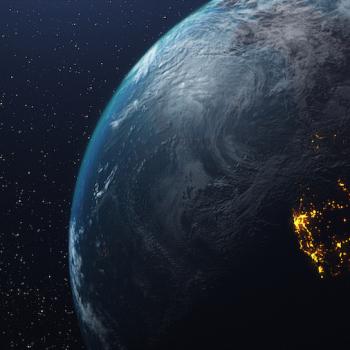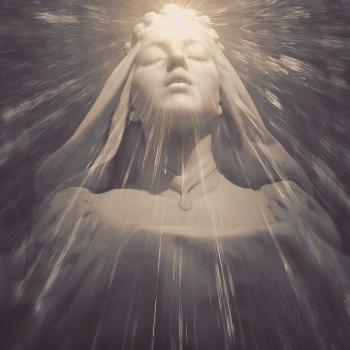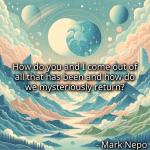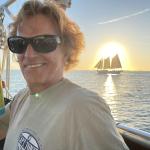10. Volunteering to be Human
Souls exist in timelessness. And, at some stage, all souls sign up for incarnational experiences where they voluntarily self–limit in order to feel what it would be like to be separated from Source and to forget, temporarily, that they are bite–size pieces of God. What would it be like to try work our way back? What musculature would we have to develop to force ourselves to remember who we really are?
At some stage, every soul is going to volunteer for separation from Source. They’re not all going to come to Planet Earth. Some will go to different planetary systems. Some will go into different dimensions. But all of them will strap themselves into this kind of game that God plays, which I call “Hide–and–Go‐Seek”. God plays “Hide–and–Go‐Seek” with Herself. She tends to manifest aspects of Herself which forget that they are aspects of Herself. And they act as if they’re separated from each other, from nature and from Source.
The game then begins to become “Can You Remember?” In the middle of all the vicissitudes of incarnation, “Can you remember that you’re not separated from anybody else and that you’re not separated from nature, and that you’re not separated from Source?”. That becomes the soul’s game of walking its way back.
And every single one of us has volunteered for that. And when we volunteered, none of us came down as individuals. We came down roped together in what I call “Soul Pods”. So, we find that there are people in our lives with whom we move from incarnation to incarnation. The roles are different from lifetime to lifetime. And the relationships are different. Genders may be different. The I.Q. level may be different. The socio–economic status may be different. The ethnicity may be different. The religious affiliation may be different. But it is the same pod, the same group of souls, moving from incarnation to incarnation, creating a drama which affords each individual soul the ideal circumstances to develop a particular virtue or virtues it wants to work on for the incarnation, whether that’s compassion, courage, patience, integrity — or whatever it is.
And we also bring into our life people from, what I call our “Shadow Pod” — people who really test us. And they’re as important to us as the people who love us because we need weeders and fertilizers in our garden to make the garden thrive. And we need weeders and fertilizers in our psyche and in our spirituality to make our souls advance and grow. So, we bring into our lives, by agreement, people whom we find difficult to love. And that’s why Jesus would say, “You must love your enemies”. He’s not talking about lying down and letting people walk all over you. He’s saying “Recognize that you’ve contracted with each other, that these people are part of your life to test you and to weed your life”.
And, the best part of volunteering to be human is that we come with basically four aspects — physicality, emotionality, intellectuality, and personality. And each of these is equipment for the journey. Physicality is the spacesuit we inhabit with the particular organs and sensorium. And that’s part of what we need to experience incarnation. We also come with an innate gift of emotionality so that we can relate to life, not on just a physical level, but on the level of compassion. We come with intellectuality, so that we have the mind’s ability to reason and to think about thinking. And we come with a personality, which is the interface between the spacesuit and the environment.
And there’s one last point to be said about the equipment. I’m going to distinguish between the brain and consciousness. I am totally against the materialistic, reductionist scientific model we have in the West which claims that consciousness is merely an epiphenomenon, a brain activity, a bio–electronic circuitry, which in the process of performing, creates the illusion of consciousness. For me, that’s pathetic. Rather I believe that the brain is simply a tuning mechanism that consciousness uses to broadcast in a particular wavelength.
Thinking that the brain produces consciousness is like thinking that a TV set creates the ballgame. Imagine that you’re watching on a small black and white TV. The 49ers are playing. And they play horribly! And you think, “Oh my God. If I can just rush out to Best Buy and get a 52-inch plasma high-definition screen and plug it in, the 49ers will play better”. That’s how we think. We think that the size and ability of our brains are going to improve the quality of consciousness. The size and ability of our brain can improve the quality of the video but has no effect on the ballgame itself. Consciousness creates brain and uses brain as a transducing mechanism.
11. Judgment
And there isn’t a judgment at the end of this process. There’s a self–evaluation. There’s a sitting with a mentor to figure out, “Did I really accomplish what I set out to do in the incarnation I just finished? Or is there work I still need to do?” And there is no such thing as a Heaven. And there is no such thing as a Hell, a place we go to and say, “Whew! I made it” or “Damn, I’m screwed for all eternity”. There are no such Heavens or Hells.
We create the Heavens that we’re ready to meet. And we fashion the Hells that we’re stuck in because of our belief system and our lifestyle. But they’re all temporary. The Heavens are temporary. And the Hells are temporary. We’ll outgrow the Hells. And we’ll outgrow even the Heavens, when we finally realize that we must keep thinking outside the box — or we realize, ultimately, that there is only God. And we are God in drag.
Therefore, we can let go of all the in–between that happens and be at one with Source. So, for me, that’s what the evolutionary trajectory looks like as we wing our way back to God.
12. The Rules of the Game of Incarnation
So, what are the rules of the “Game of Incarnation?” When you sign–up for incarnation, you become part of this experiment. One of the rules is that we must learn to infer from our experiences how the system works. Inference is the ability to draw conclusions from and to recognize patterns in our experiences. One of the primary experiences is realizing that the Physical Universe, in which we live is, in fact, just the printout of a Metaphysical Universe.
The Greeks had two words for Universe: “Cosmos” meaning the physical Universe in which we find ourselves; and “Kosmos” meaning the metaphysical undergirding that’s responsible for the physical articulation of the Universe. The Greeks were attempting to infer the existence of the “Kosmos” from their experience of the “Cosmos”. They were also attempting to infer how the system worked so that they could play the game of incarnation properly. For example, “The Law of Karma” says that every action has a consequence. If you like the consequence, keep doing the action. If you don’t like the consequence, stop doing the action.
To learn to play the game, we must become “Scientists of Spirituality”. The typical scientific method is that the scientist will amass a bunch of observations and data and begin to recognize patterns, create a hypothesis to explain the patterns and then set up an experiment to test the hypothesis. If the hypothesis is correct, then it is repeated and replicated in other laboratories. If the results are the same, it becomes a new scientific principle. A bunch of scientific principles creates a scientific model. But at some stage, anomalous data come in and we must tweak our models. Sometimes there are so many anomalous data that we must dismantle old models and erect new ones. This happened twice in the 20th century with quantum mechanics and relativity theory. The old Newtonian model was utterly inept at the microcosmic level and had to be totally revamped.
And we must do that with our spirituality also. In the course of our observations, we have to be awake. We must collect data from our experiences. We must recognize patterns and laws and test them. We must cross–reference them with other people’s experiences and then re–establish some kind of cosmology or new laboratory for ourselves. So, we navigate through the system in a scientific fashion. Spirituality is a science that allows us to become “mysticists” — a word I coined many years ago.
A mysticist is a cross between a mystic and a scientist. It’s the ability to be scientific about spirituality, as much as we are spiritual about science. By becoming mysticists, we opt for gnosis, instead of just dogma. And the most important rule of all is the “Law of Love”. Ultimately, the only thing that works is love. We can try greed, violence, anxiety, fear, and anger. They all just create other situations with more anger and more fear and more depression and more violence. The only thing demonstrably showing that the system improves is acting with love. Because ultimately, the evolutionary trajectory is a single safari from God’s womb to God’s heart.

















